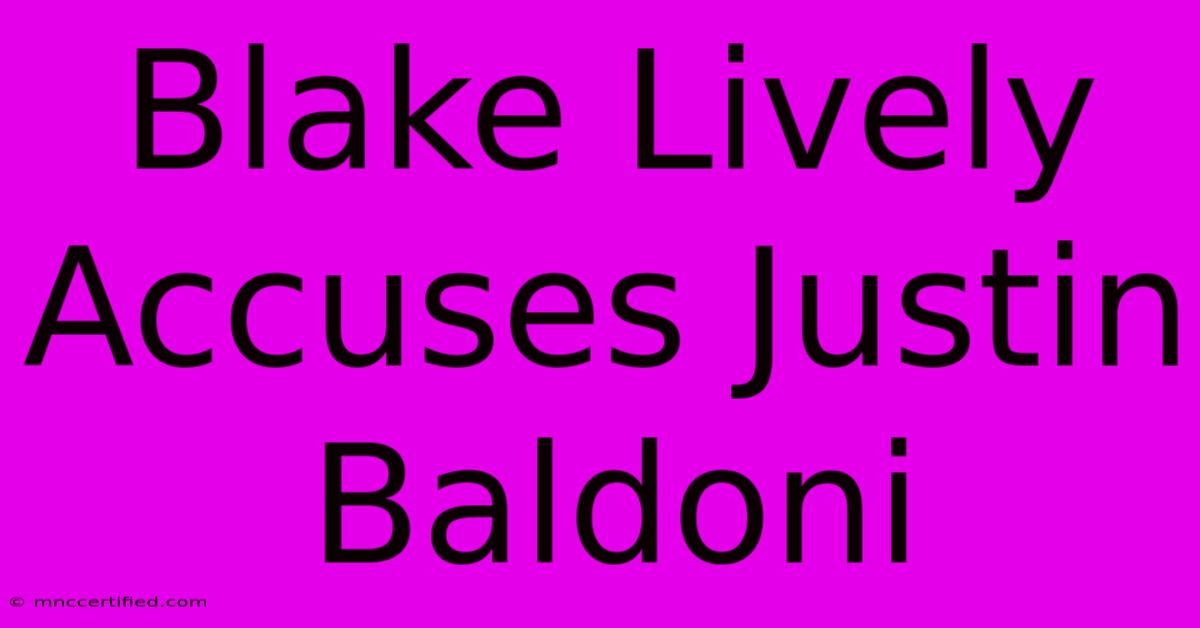Blake Lively Accuses Justin Baldoni

Table of Contents
Blake Lively Accuses Justin Baldoni: Unpacking the Speculation and Social Media Frenzy
The internet is abuzz with speculation following a recent social media post by Blake Lively, seemingly alluding to accusations against Justin Baldoni. While the specifics remain unclear and neither party has issued a direct statement, the online discourse has exploded, prompting a deep dive into the situation and its implications. This article aims to explore the unfolding events, analyze the available information, and address the ethical considerations surrounding online accusations.
The Spark: Blake Lively's Cryptic Post
The initial catalyst for this whirlwind of speculation stems from a now-viral post (or series of posts) shared by Blake Lively on [Platform, e.g., Instagram, X]. The post(s) [Describe the post: vague, cryptic, image-based, text-based, etc. Avoid direct quotes without permission]. The lack of explicit details fueled immediate interpretation, with many speculating that the post was directed towards Justin Baldoni.
What fueled the speculation?
The speculation connecting Lively's post to Baldoni largely stems from [Explain the connection: prior collaborations, mutual acquaintances, shared projects, etc.]. This existing connection provides fertile ground for interpretation, with many users connecting the dots based on their own understanding of the actors' public personas and professional relationships. The ambiguity of Lively's message, therefore, leaves plenty of room for conjecture and fuels online discussion.
The Online Response: A Case Study in Social Media Amplification
The internet's response has been swift and significant, showcasing the power—and potential pitfalls—of social media in disseminating information, particularly when dealing with potentially sensitive accusations. The #BlakeLively and #JustinBaldoni hashtags have quickly gained traction, with users sharing their interpretations, supporting Lively, defending Baldoni, or calling for more clarity.
Ethical Considerations: The Perils of Online Accusations
The situation highlights the critical ethical implications of online accusations. The lack of concrete evidence and the potential for misinterpretation underscore the need for caution and responsible online behavior. Accusations, particularly serious ones, should not be made lightly, and the potential for reputational damage to both the accused and the accuser must be considered. It's vital to remember that unsubstantiated claims can have severe consequences.
The Importance of Due Process and Verification
Given the lack of verifiable information, it's crucial to approach this situation with a degree of skepticism. Until either Blake Lively or Justin Baldoni issues a clear statement, or evidence emerges, all interpretations remain speculative. The importance of due process and the need to avoid jumping to conclusions cannot be overstated. Rushing to judgment can lead to harmful consequences and damage reputations unfairly.
What to expect moving forward?
Several scenarios are possible. Blake Lively might choose to clarify her post, providing more context. Justin Baldoni might issue a response, addressing the speculation. Alternatively, both parties might choose to remain silent, allowing the online conversation to eventually subside. Regardless of how it unfolds, the situation serves as a stark reminder of the complexities of online communication and the responsibility individuals have to ensure accurate and fair reporting.
Conclusion: The Need for Responsible Online Discourse
The situation surrounding Blake Lively's apparent accusation against Justin Baldoni underscores the need for careful consideration in sharing information online, particularly when dealing with potentially sensitive topics. The power of social media to amplify narratives, both true and false, should be acknowledged and addressed. Until concrete evidence is presented, caution, critical thinking, and responsible online behavior remain paramount. The focus should shift from speculation to a responsible and ethical approach to handling such sensitive information. Let’s wait for clarification from the involved parties before forming definitive conclusions.

Thank you for visiting our website wich cover about Blake Lively Accuses Justin Baldoni. We hope the information provided has been useful to you. Feel free to contact us if you have any questions or need further assistance. See you next time and dont miss to bookmark.
Featured Posts
-
Bet On Fury Vs Usyk How And Where
Dec 22, 2024
-
City Loses To Aston Villa
Dec 22, 2024
-
Another One Score Win For Mahomes
Dec 22, 2024
-
Premier League Aston Villa Vs Man City Result
Dec 22, 2024
-
Texans Vs Chiefs How To Watch
Dec 22, 2024